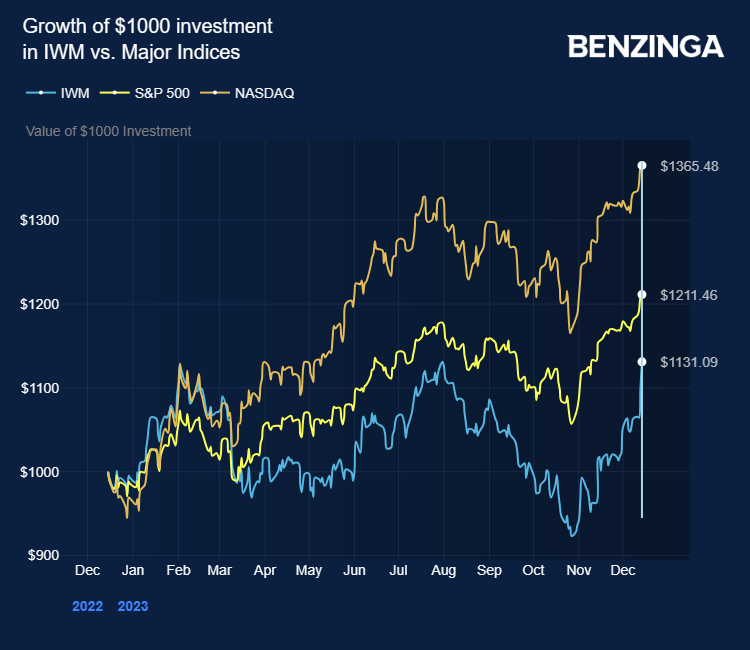Zinger Key Points
- Small cap stocks were oversold during the slump and have outperformed in the recent rally.
- Higher interest rates increase the cost of capital for smaller businesses.
- Feel unsure about the market’s next move? Copy trade alerts from Matt Maley—a Wall Street veteran who consistently finds profits in volatile markets. Claim your 7-day free trial now.
Small cap stocks have been on a tear since the Federal Reserve signaled an end to its cycle of rate hikes at Wednesday’s policy meeting.
Smaller listed companies are much more sensitive to interest rates than large caps, mostly because many higher relative levels of debt become more difficult to service when rates are high.
But with Fed rate cuts now expected in the early part of 2024, the Russell 2000 index has shot up to a 16-month high, having jumped 6.8% since the Fed announced its pivot to a more dovish policy stance on Wednesday.
Also Read: SEC Vs. Elon: Judge Rules Musk Must Testify Again
Monetary Policy Euphoria
“Nothing screams monetary policy euphoria more than the plethora of markets that have gone from year-to-date lows to now year-to-date highs all in the space of just two months,” said Barnaby Martin, strategist at Bank of America.
The iShares Russell 2000 ETF IWM, an exchange traded fund that most closely follows the Russell small cap index, rose 6.4% in the past two days, while the iShares Core S&P Small-Cap ETF IJR, the largest and most liquid small cap ETF, was up 6.3% since the Fed meeting.

Like most equity indices, the Russell 2000 began its ascent in late October as the Fed held its main interest rate at 5.25%-5.5% for a second successive meeting. Increasingly dovish Fed rhetoric and slowing inflation rates helped propel stock markets further throughout November and December.
Since hitting a three-year low in late October, the Russell has jumped 22.4% compared with a 14.6% rise for the S&P 500 over the same period and a 14.9% gain on the mega-cap Dow Industrials.
Small Caps Were Oversold
While small caps have outperformed large caps during the rally over the past two months, they were sold off more heavily during the downturn that preceded the rally. This took small caps into “oversold” territory, according to Nicholas Colas, co-founder at DataTrek.
“Higher interest rates put significant pressure on small, often unprofitable, growth companies because they raise these businesses' cost of capital,” said Colas.
He added: “Conversely, the S&P 500 is dominated by large, money-making companies with much less need for incremental capital.”
Thus, for small caps to continue their rally into 2024, investors would need to be convinced there’s no recession that could erode balance sheets and interest rates would begin to normalize.
Now Read: Will Unemployment Spike In 2024? History Of Fed Rate Cuts Would Suggest So
Photo: Shutterstock
Edge Rankings
Price Trend
© 2025 Benzinga.com. Benzinga does not provide investment advice. All rights reserved.
Trade confidently with insights and alerts from analyst ratings, free reports and breaking news that affects the stocks you care about.